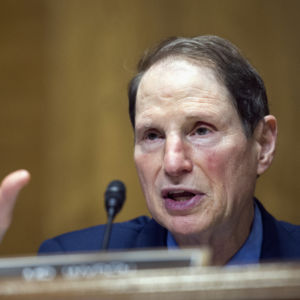Democratic Sen. Ron Wyden took the opportunity to show his disapproval for a new healthcare bill Tuesday during a hearing intended to discuss tax reform.
The Senate Finance Committee convened the hearing to discuss ways to improve the tax code. Republicans have made tax reform one of their top priorities since the election. Committee Chairman Orrin Hatch noted that the goal is to boost jobs with good wages by reforming business provisions within the tax system.
“During this morning hearings, we’ll be discussing ways to improve the business provisions of the U.S. tax code with an eye towards creating jobs that boost wages for American workers,” Hatch, a Republican, said in his opening remarks. “This hearing is part of an ongoing effort following years of tax hearings.”
Wyden, who serves as the ranking member, decided to take a different approach during the hearing. He instead argued his colleagues on the right are trying to unilaterally push a healthcare bill despite its disastrous consequences. Republican Sens. Lindsey Graham, Bill Cassidy, Dean Heller, and Ron Johnson introduced the bill Sept. 13.
“Last night the majority announced, without consulting the minority, that the finance committee will be holding a hearing on the Graham-Cassidy healthcare bill,” Wyden said. “I think this is an abomination. It is an abomination of the process, it’s an abomination of the of the substance, and it’s abomination of the history of this storied committee.”
The healthcare bill is just the latest attempt to repeal and replace the Affordable Care Act. Republicans failed to replace the bill, repeal it without a replacement, or even cut some provisions with a skinny repeal. Wyden believes the latest attempt could have severe repercussions for millions of people.
“First of all, this bill is a subscription for suffering and disastrous consequences for millions of people,” Wyden said. “Second the budget office informed the Congress that it will be several weeks, at the very least, before it can provide real estimates for the bill. So this means the majority is going to charge ahead with a radical and destructive transformation of America’s healthcare with the American people in the dark.”
Wyden did express that his remarks aren’t meant as an attack against Hatch. Wyden highlighted their bipartisan work and his admiration for the chairman. But he felt compelled to speak out against what he saw as a real threat to the health and well-being of people.
“This bill is going to be a few roll call votes away from the president’s desk, yet Republicans don’t have answers to some of the key gut questions,” Wyden said. “What’s going to happen to premiums for the American people? What is going to happen to their coverage?”
Former President Barack Obama made his healthcare law his signature piece of legislation. Republicans have made repealing Obamacare their main rallying point through his presidency. They have argued the law has caused premiums to skyrocket, significant coverage gaps, and a reduction in insurance options.
“The proposition that a bill this destructive, this far-reaching, can swing through the Senate Finance Committee for a single hearing on a Monday morning, hit the Senate floor a day or two later, makes a mockery of the legislative process that Sen. [John] McCain so elegantly urged us to return to,” Wyden said.
Wyden ended his remarks by talking briefly about some concerns he had with the upcoming tax reform bill. He urged his colleagues on the right to avoid provisions that could be manipulated and turned into loopholes by big corporations, like making it easier to become a pass-through business, which is reserved for smaller employers.
“A hearing will allow members on both sides to dive deeper into the policy, and gain a better understanding of what the proposal is intended to achieve,” Hatch responded afterward. “But even though their requests have been heard, and a hearing is on the schedule, some members are still unsatisfied. I’m not sure what else we can do on this matter to address every complaint. For today, our hearing is on business tax reform.”
Republicans have been building the foundation to mount their push for tax reform over the last year. House Speaker Paul Ryan and Rep. Kevin Brady introduced a blueprint last year which detailed their policy goals. President Donald Trump released a summary plan which highlighted many of the same provisions April 26.
Republicans have been consistent with the general direction they hope to take tax reform. They hope to lower individual and business rates while also simplifying the tax code. They have had some disagreements over specific provisions like the border adjustment tax, which has likely been dropped.
The Congressional Budget Office (CBO) found in an analysis that many other developed countries have been moving towards a more competitive tax system for over a decade. The United States, in contrast, has done little to its tax code to stay competitive since the last time the tax system was reformed in a fundamental way in 1986.
The Business Roundtable found in a survey that business owners would begin investing more back into their companies and employees if the tax system was reformed successfully. National Taxpayers Union Foundation found in a 2015 study that the economy loses $233.8 billion annually from hours spent doing taxes.

